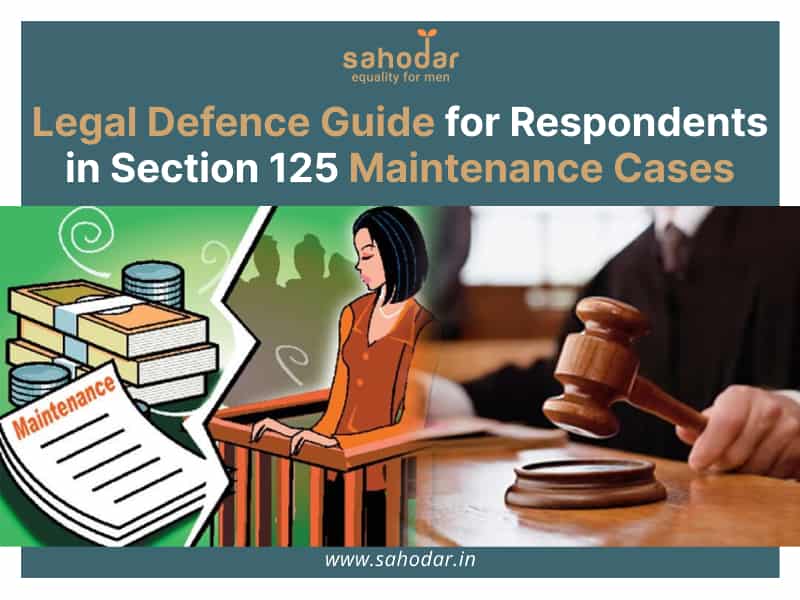Introduction:
Maintenance or alimony cases under Section 125 of the Code of Criminal Procedure (CrPC) in India are pivotal components of family law, designed to ensure financial support for spouses, children, and parents who are unable to maintain themselves. While the statute primarily serves the purpose of providing relief to economically weaker parties, respondents, especially men, facing potential financial obligations should be cognizant of the legal intricacies surrounding such proceedings. This article aims to delve into comprehensive legal strategies and considerations for respondents navigating maintenance or alimony cases under Section 125 CrPC.
Understanding Section 125 CrPC:
Section 125 CrPC is a statutory provision that enables a spouse, children, or parents to claim maintenance from a person who has the financial capacity to provide support but neglects to do so. The underlying principle is to safeguard the necessities of life for those who are unable to sustain themselves financially.
- Demonstrating Financial Incapacity:
- Articulating a robust defense against maintenance claims necessitates a meticulous exposition of financial incapacity. Relevant factors may include unemployment, financial hardships, or meager income.
- Comprehensive documentation of financial records, including income statements, tax returns, and other relevant evidence, is imperative to substantiate claims of limited financial means.
- Substantiating Claims of Desertion or Adultery:
- Allegations of desertion or adultery can be valid defenses if proven with due diligence. However, the legal threshold for establishing such claims is high.
- Engaging legal counsel becomes crucial to adeptly gather and present compelling evidence, such as witness testimonies, communication records, or other corroborative documentation.
- Contesting the Prima Facie Need for Maintenance:
- Contesting the need for maintenance involves challenging the petitioner’s assertions. This may necessitate demonstrating self-sufficiency or illustrating the petitioner’s capacity for self-maintenance.
- Evidence supporting this stance may include the petitioner’s educational qualifications, vocational skills, and employability. Legal representation is essential for formulating and presenting a cogent legal argument.
- Facilitating Out-of-Court Settlements Through Legal Counsel:
- Negotiating an out-of-court settlement requires legal acumen to ensure fairness and legality. Legal counsel aids in crafting settlement terms that align with statutory provisions and protect the respondent’s interests.
- The terms of any settlement should be carefully reviewed and vetted by legal professionals to avoid future disputes.
- Retention of Legal Representation:
- The complexity of maintenance proceedings necessitates the engagement of a skilled family law attorney. Legal representation is crucial for navigating procedural intricacies, presenting evidence effectively, and formulating a strategic defense.
- Legal counsel also assists in understanding the nuances of case law, precedent, and evolving legal interpretations that may impact the outcome of the case.
- Appellate Remedies for Unjust Decisions:
- In cases where the court’s decision appears unjust, respondents have the option to pursue appellate remedies. Grounds for appeal may include legal errors, procedural irregularities, or insufficient consideration of evidentiary material.
- Legal representation remains vital during the appellate process to ensure a comprehensive and effective presentation of the case before a higher judicial forum.
Conclusion:
Maintenance or alimony proceedings under Section 125 CrPC demand a thorough understanding of legal nuances and a strategic approach to protect the rights and interests of respondents. By proactively engaging legal counsel, presenting a well-documented case, and exploring negotiation avenues, respondents can navigate these proceedings with a greater likelihood of achieving a fair and just resolution within the parameters of the Indian legal framework.

